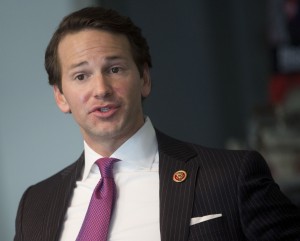On the Hill: Schock to the System

Last week, scandal struck the capital when Rep. Aaron Schock, a rising star out of Illinois, abruptly resigned his seat due to potential ethics violations. Schock’s finances received close scrutiny after a Washington Post story exposed how his congressional office underwent an expensive Downton Abbey-style remodeling, with all costs initially provided for by a donor. While Schock has since doled out hefty sums for his remodeling and other questionable expenses, the attention he has faced in recent days eventually forced the Congressman to resign.
What got Schock in trouble was his apparently low standards of financial accountability, which also impacted the legislation he introduced in the past. In fact, Schock is the original sponsor of a bill in the House that is rife with accountability and transparency problems and which would give religious Americans a special benefit that non-religious American wouldn’t be able to enjoy.
This bill, the Equitable Access to Care and Health (EACH) Act, was also introduced in the previous Congress and failed to pass the legislature (though it did pass the House) even with bi-partisan support. The EACH Act as written would allow anyone with “sincerely held religious beliefs” objecting to modern medicine to be exempt from the mandate in the Affordable Care Act to buy health insurance.
As I mentioned in a previous article about the bill, the EACH Act is problematic for several reasons, the first of which is that it fundamentally weakens the health care law colloquially known as Obamacare by decreasing the number of people who buy health insurance, which in turn raises the average premium paid by those who have insurance. Secondly, the EACH Act gives religious Americans a specific benefit, that of not being fined via the individual mandate for not purchasing health insurance, that secular and non-religious Americans cannot enjoy simply because they are not religious.
What I hadn’t mentioned at the time was that there are major issues with accountability within the bill, which seem especially relevant considering the plight the bill’s original sponsor currently finds himself in. As Pete Kasperowicz of The Hill notes in a recent article, a major problem with the bill is that it states that “anyone who gets a religious exemption and then seeks medical treatment would have their exemption revoked,” but as Kasperowicz points out, “the IRS would have no way of monitoring people who later decide to seek treatment.” Just as significant is the fact that the bill doesn’t define what a “sincerely held religious belief” actually is, creating a situation rife for abuse in which those people who simply don’t want to have health insurance can claim a religious exemption against doing so.
The bad news is that even though Schock has announced that he will resign, his bill still has a chance of passing Congress, perhaps under another sponsor. While the bill had passed the House last Congress only to be defeated by the Democratically-controlled Senate, the new Republican-controlled Senate could easily pass the bill. With both bills enjoying bi-partisan support, the only person standing in the EACH Act’s way is President Obama, who hopefully will see that any further attacks against his landmark achievement, the Affordable Care Act, will weaken the program and jeopardize the health of countless Americans.
